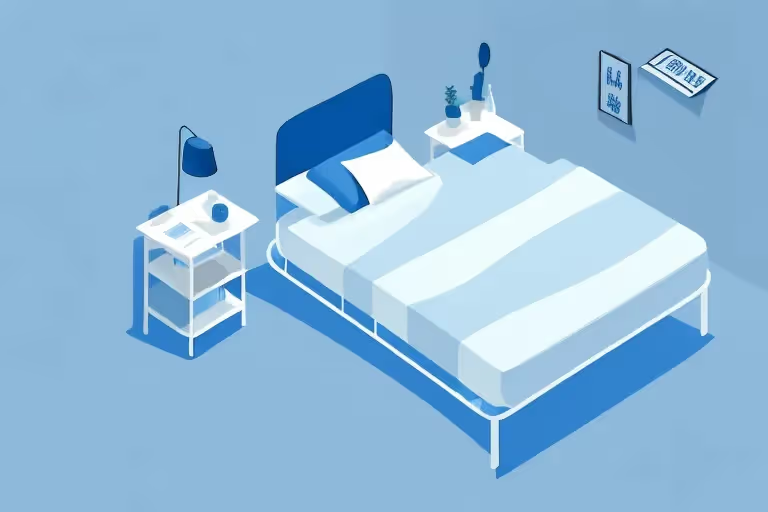Have you been struggling to get a good night's sleep? If restlessness, insomnia, or sleep-related anxiety have been keeping you awake, you may be interested in learning more about using mirtazapine as a potential solution. In this article, we will delve into the benefits and risks of using mirtazapine for sleep, so you can make an informed decision about how to improve your sleep quality and reclaim those precious hours of rest.
Understanding Mirtazapine
Before diving into the benefits and risks of using mirtazapine for sleep, let's take a moment to understand what exactly mirtazapine is. Mirtazapine is an antidepressant medication that is commonly prescribed to help manage symptoms of depression. However, it has also been discovered to have potential effects on sleep patterns and can help individuals struggling with sleep-related issues.
What is Mirtazapine?
Mirtazapine is a medication that belongs to a class of drugs called noradrenergic and specific serotonergic antidepressants (NaSSAs). It works by blocking specific receptors in the brain, which can help in managing symptoms of depression as well as promoting better sleep.
Mirtazapine is a white, crystalline powder that is soluble in water. It was first approved by the U.S. Food and Drug Administration (FDA) in 1996 for the treatment of major depressive disorder. Since then, it has been widely used and studied for its various effects on mental health.
When taken orally, mirtazapine is rapidly absorbed by the body and reaches peak plasma concentrations within two hours. It has a half-life of about 20-40 hours, meaning it stays in the body for a relatively long time. This prolonged presence in the system allows for sustained therapeutic effects.
How Does Mirtazapine Work?
Mirtazapine primarily works by increasing the levels of certain neurotransmitters in the brain, such as serotonin and norepinephrine. By doing so, it can have a sedating effect and help regulate sleep patterns. Additionally, mirtazapine also blocks certain histamine receptors, which further contributes to its sleep-enhancing properties.
The increased levels of serotonin and norepinephrine in the brain help improve mood and reduce symptoms of depression. Serotonin is often referred to as the "feel-good" neurotransmitter, as it plays a crucial role in regulating emotions, sleep, and appetite. Norepinephrine, on the other hand, is involved in the body's stress response and can help increase alertness and focus.
By blocking histamine receptors, mirtazapine reduces histamine's effects in the brain, leading to drowsiness and sedation. Histamine is a neurotransmitter that plays a role in wakefulness and arousal. By inhibiting its activity, mirtazapine can promote a more relaxed state, making it easier for individuals to fall asleep and stay asleep throughout the night.
It's important to note that the exact mechanisms of how mirtazapine works are not fully understood. Researchers believe that its effects on multiple neurotransmitters and receptors contribute to its overall therapeutic benefits.
Overall, mirtazapine is a versatile medication that not only helps manage symptoms of depression but also has the potential to improve sleep patterns. Its unique mechanism of action sets it apart from other antidepressants and makes it a valuable option for individuals struggling with both mental health and sleep-related issues.
The Role of Mirtazapine in Sleep
Now that we have a basic understanding of mirtazapine, let's explore how it can play a role in improving sleep.
Sleep is a vital aspect of our overall well-being, affecting our physical, mental, and emotional health. However, sleep disorders, such as insomnia and sleep apnea, can greatly impact an individual's quality of life. Fortunately, studies have shown that mirtazapine, a commonly prescribed antidepressant, can be effective in treating certain sleep disorders and promoting better sleep initiation and maintenance.
Mirtazapine and Sleep Disorders
Insomnia, characterized by difficulty falling asleep or staying asleep, can be incredibly frustrating and exhausting. Sleep apnea, on the other hand, is a condition where breathing repeatedly stops and starts during sleep, leading to disrupted sleep patterns. Both of these sleep disorders can significantly affect an individual's daily functioning and overall well-being.
Research has shown that mirtazapine can help address the underlying causes of sleep disturbances. By targeting specific neurotransmitters in the brain, mirtazapine can help regulate sleep-wake cycles and promote a more restful and rejuvenating sleep experience. It has been found to increase sleep efficiency, reduce sleep latency (the time it takes to fall asleep), and decrease the number of awakenings during the night.
How Mirtazapine Affects Sleep Patterns
Mirtazapine not only improves the quantity of sleep but also influences the quality of sleep. One of the ways it does this is by increasing the amount of time spent in deep sleep, also known as slow-wave sleep. Deep sleep is an essential stage of sleep where the body repairs and regenerates itself. It plays a crucial role in memory consolidation, immune function, and overall physical restoration.
Additionally, mirtazapine has been shown to reduce the time spent in REM sleep, which is the stage of sleep associated with vivid dreaming. While REM sleep is necessary for cognitive function and emotional well-being, excessive time spent in this stage can lead to sleep disturbances, such as nightmares or sleepwalking. By modulating REM sleep, mirtazapine can be particularly beneficial for individuals experiencing sleep disturbances related to post-traumatic stress disorder (PTSD) or other trauma-related conditions.
Furthermore, mirtazapine has a sedating effect, which can help individuals with insomnia fall asleep more easily. Unlike some other sleep medications, mirtazapine is less likely to cause next-day grogginess or impair daytime functioning, making it a favorable option for those seeking a restful night's sleep without the lingering effects.
It is important to note that mirtazapine should only be used under the guidance of a healthcare professional, as it may interact with other medications or have potential side effects. A thorough evaluation of one's sleep patterns and a comprehensive understanding of the underlying sleep disorder are crucial in determining the appropriate use of mirtazapine or any other sleep medication.
The Benefits of Using Mirtazapine for Sleep
Now that we've explored how mirtazapine can positively impact sleep, let's dive into some of the specific benefits you may experience if you decide to incorporate mirtazapine into your sleep routine.
Improvement in Sleep Quality
One of the most significant benefits of using mirtazapine for sleep is the potential improvement in overall sleep quality. By promoting longer and deeper sleep cycles, mirtazapine can help you wake up feeling refreshed and energized, ready to tackle the challenges of the day ahead.
Reduction in Sleep-related Anxiety
Sleep-related anxiety can be a vicious cycle, with anxiety preventing sleep and lack of sleep exacerbating anxiety. Mirtazapine has been shown to have an anxiolytic effect, meaning it can reduce feelings of anxiety and promote a sense of calmness, ultimately leading to a more peaceful and restful sleep experience.
The Risks and Side Effects of Mirtazapine
While mirtazapine can have numerous benefits for sleep, it's essential to be aware of the potential risks and side effects that may arise from its use.
Common Side Effects
Like any medication, mirtazapine can cause certain side effects. These can include drowsiness, dizziness, dry mouth, and increased appetite. These side effects are generally mild and tend to improve over time as your body adjusts to the medication. However, it is essential to discuss any persistent or concerning side effects with your healthcare provider.
Serious Side Effects
In rare cases, mirtazapine can lead to more severe side effects such as allergic reactions, changes in heart rhythm, or jaundice. It's crucial to seek immediate medical attention if you experience any of these symptoms while taking mirtazapine.
Long-term Risks of Mirtazapine Use
Long-term use of mirtazapine can also have potential risks. It may lead to weight gain or an increased risk of developing metabolic conditions such as diabetes or high cholesterol. Regular check-ups with your healthcare provider can help monitor and manage these potential risks if you decide to use mirtazapine for an extended period.
Considerations Before Starting Mirtazapine
Before starting mirtazapine as a sleep aid, it's important to consider a few key factors that may influence its effectiveness and potential risks.
Drug Interactions
Interactions between mirtazapine and other medications can occur. It's essential to inform your healthcare provider of all the medications you are currently taking to ensure there are no potential interactions that could compromise your safety or the efficacy of mirtazapine as a sleep aid.
Pre-existing Health Conditions
Individuals with certain health conditions may need to exercise caution when considering mirtazapine as a sleep aid. Conditions such as glaucoma, liver disease, or urinary retention may require adjustments in dosage or alternative sleep solutions. Always consult with your healthcare provider to determine if mirtazapine is suitable for your specific health situation.
Lifestyle and Dietary Considerations
Modifying certain lifestyle and dietary factors can also enhance the effectiveness of mirtazapine for sleep. Avoiding alcohol and caffeine, establishing a regular sleep schedule, and creating a relaxing bedtime routine can all contribute to a more positive sleep experience when combined with mirtazapine.
When considering the use of mirtazapine for sleep improvement, it is important to consult with your healthcare provider to assess the potential benefits, risks, and any individual considerations specific to your situation. By working together, you can weigh the potential benefits against the risks and make an informed decision about incorporating mirtazapine into your sleep routine.
Try integrating Aura Health App into your daily routine alongside mirtazapine. The app offers a variety of guided meditation and calming exercises to complement the sleep-enhancing properties of mirtazapine. Together, mirtazapine and the Aura Health App can support your journey towards improved sleep and overall well-being.
Aura is Your All In One App for Meditation, Mindfulness Wellbeing
Find peace every day with one app for your whole well-being. There is no one-size-fits-all solution to mental well-being. Aura is the first all-in-one wellness app that learns how to best help you. Discover an endless library of expert-created tracks for your well-being, all taught by the world’s best coaches, therapists, and storytellers. With Aura's personalized recommendations, you can find peace every morning, day and night.



.webp)






.avif)

%20(1).avif)


.avif)
.avif)
.webp)


.avif)


















































































































.avif)

















.svg)









